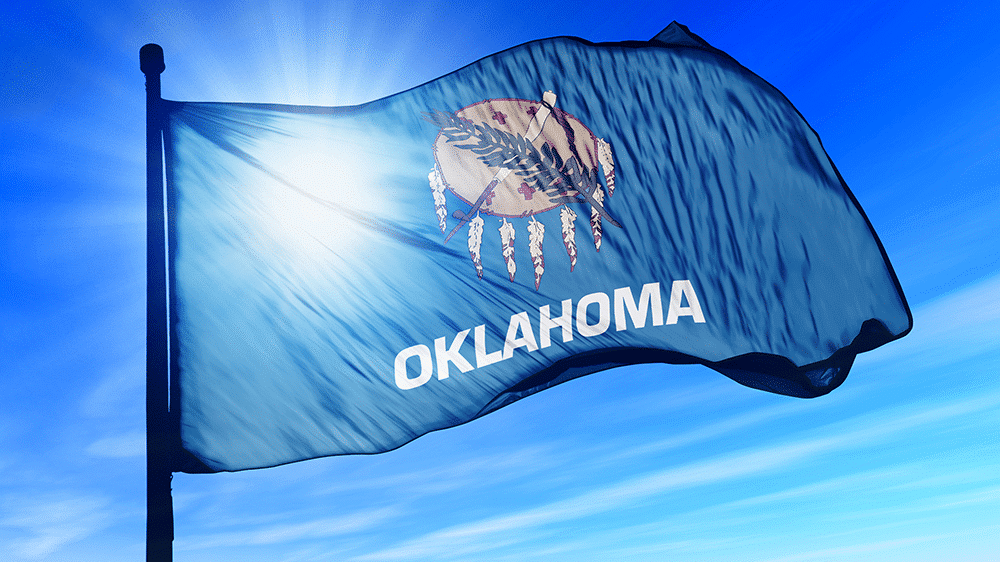Last Thursday, Oklahoma Gov. Kevin Stitt signed a bill into law that formalizes and expands the state’s medical marijuana program, further nullifying federal cannabis prohibition in effect.
Last summer, Oklahoma voters approved a measure legalizing medical marijuana in the state. A coalition of three Republicans introduced House Bill 2612 (HB2612) on Feb. 4 to create a regulatory structure and establish important patient protections for the state medicinal cannabis program.
The Oklahoma House passed HB2612 by a 93-5 vote. The Senate approved the measure 43-5. With Gov. Stitt’s signature, the bill will take effect 90 days after the legislature adjourns.
The new law creates the Oklahoma Medical Marijuana Authority and establishes a registry for qualified patients and their caregivers. It also creates a revolving fund to handle fees, taxes and fines related to the medical marijuana program.
The expanded patient protections written into HB2612 are significant. Under the law, “a medical marijuana patient or caregiver licensee shall not be denied the right to own, purchase or possess a firearm, ammunition, or firearm accessories based solely on his or her status as a medical marijuana patient or caregiver licensee.”
It also prohibits the state from denying a medical marijuana patient access to public assistance programs, including Medicaid, SNAP and WIC.
As Suzanne Sherman noted, the federal government has long claimed the power to restrict the right to keep and bear arms of medical marijuana patients:
If you purchase a firearm from an FFL, you will be presented with the Firearms Transaction Record form 4473, which you must, under penalty of perjury, answer fully and truthfully. You may see it for yourself HERE.
Question 11(c) asks prospective gun purchasers if they are unlawfully using any controlled substances. You think, “Hey, I can answer ‘no,’ as marijuana is now legal in my state. Immediately following the inquiry is the following admonition (in bold letters):
“Warning: The use or possession of marijuana remains unlawful under Federal law, regardless of whether it has been legalized or decriminalized for medicinal or recreational purposes in the state where you reside.”
Not surprisingly, in 2016, the U.S. Ninth Circuit Court of appeals ruled that this restriction does not violate the Second Amendment.
Most states have adopted this federal ban on owning firearms for medical marijuana users, or simply help in its enforcement. For instance, police in Hawaii sent letters to medical marijuana patients who owned guns telling them they had 30 days to surrender their weapons.
While passage of HB2612 does not overturn the federal Gun Control Act of 1968, it does remove the state and local enforcement arm of that unconstitutional act as it applies to medical marijuana users in Oklahoma.
FEDERAL PROHIBITION
While medical marijuana has become widely accepted across the U.S., the federal government still claims it is illegal. As we’ve seen with immigration sanctuary cities, when state and local enforcement ends, the federal government has an extremely difficult time enforcing their acts.
Under the Controlled Substances Act (CSA) passed in 1970, the federal government maintains complete prohibition of marijuana. Of course, the federal government lacks any constitutional authority to ban or regulate marijuana within the borders of a state, despite the opinion of the politically connected lawyers on the Supreme Court. If you doubt this, ask yourself why it took a constitutional amendment to institute federal alcohol prohibition.
Oklahoma’s medical marijuana program removes a layer of laws prohibiting the possession and use of marijuana, and passage of HB2612 expand that, but federal prohibition remains in place.
FBI statistics show that law enforcement makes approximately 99 of 100 marijuana arrests under state, not federal law. By curtailing state prohibition, Kentucky could sweep part of the basis for 99 percent of marijuana arrests.
Furthermore, figures indicate it would take 40 percent of the DEA’s yearly annual budget just to investigate and raid all of the dispensaries in Los Angeles – a single city in a single state. That doesn’t include the cost of prosecution either. The lesson? The feds lack the resources to enforce marijuana prohibition without state assistance.
A GROWING MOVEMENT
The Sooner State joins a growing number of states simply ignoring federal prohibition, and nullifying it in practice.
Colorado, Washington state, Oregon and Alaska were the first states to legalize recreational cannabis, and California, Nevada, Maine and Massachusetts joined them after ballot initiatives in favor of legalization passed in November 2016. In 2018, Michigan voters approved recreational marijuana and Vermont became the first state to fully legalize marijuana through a legislative act.
With 33 states and the District of Columbia allowing cannabis for medical use, the feds find themselves in a position where they simply can’t enforce prohibition anymore.
“The lesson here is pretty straightforward. When enough people say, ‘No!’ to the federal government, and enough states pass laws backing those people up, there’s not much the feds can do to shove their so-called laws, regulations or mandates down our throats,” Tenth Amendment Center founder and executive director Michael Boldin said.
This article was sourced from The Tenth Amendment Center.


Be the first to comment on "Signed by the Governor: Oklahoma Law Prohibits Denial of Firearms Ownership Based on Medical Marijuana Use"